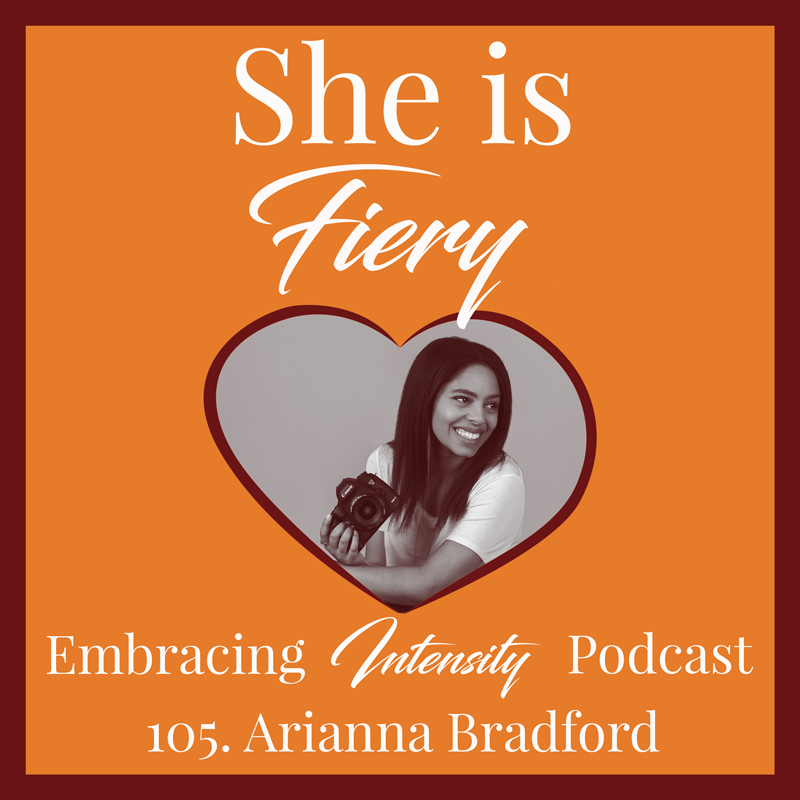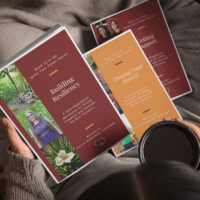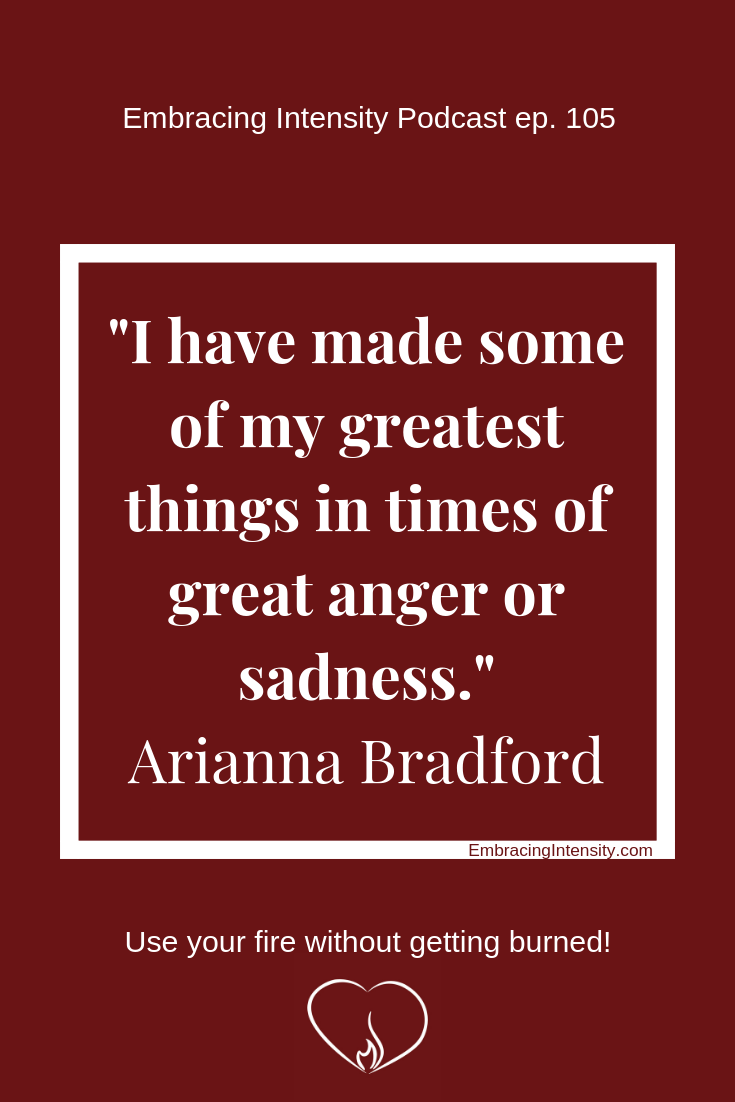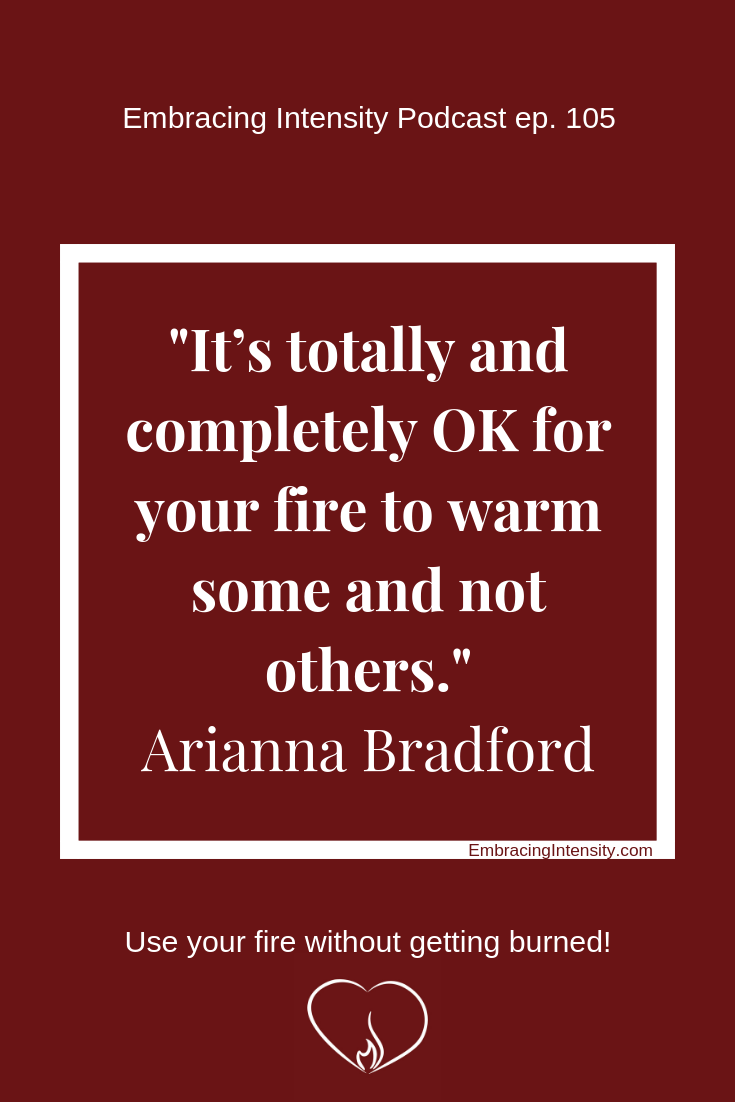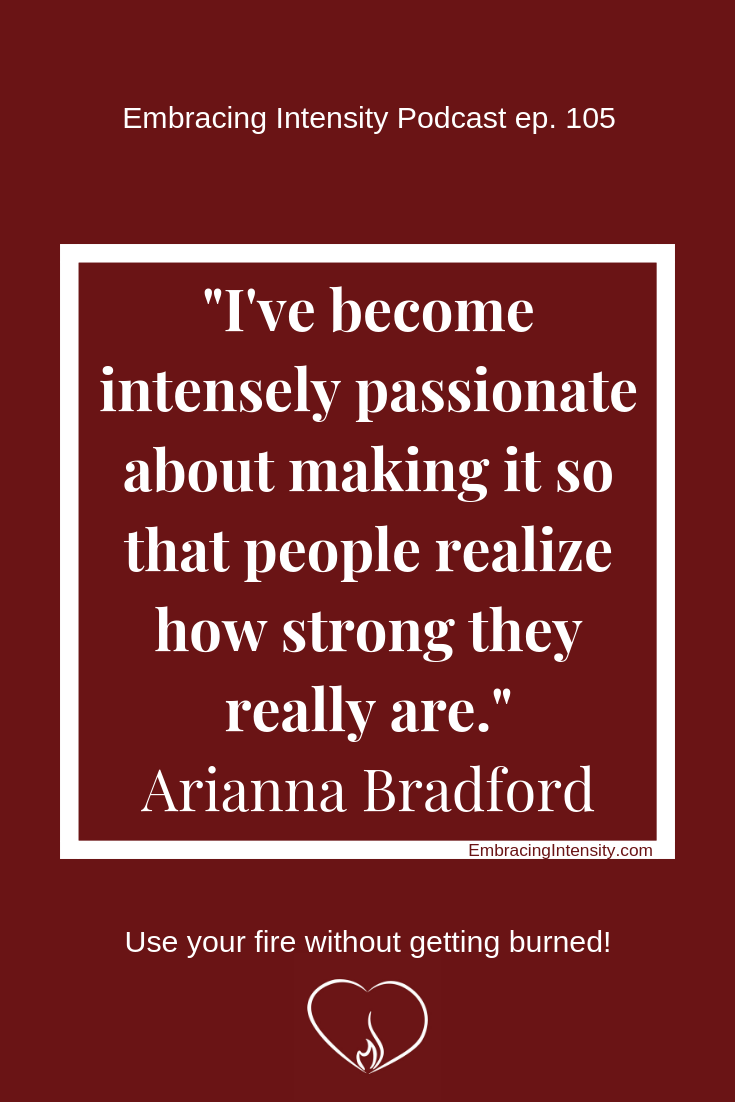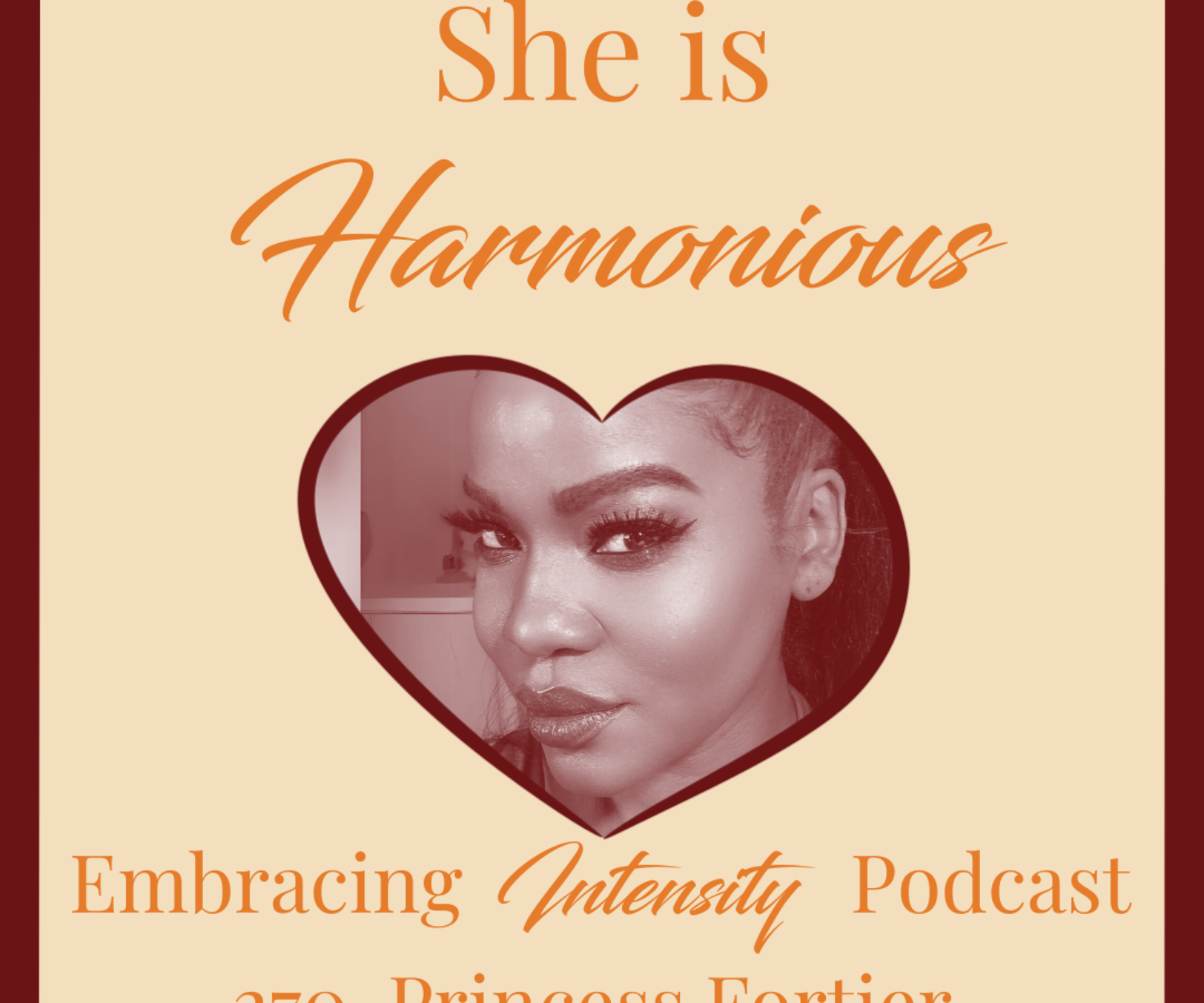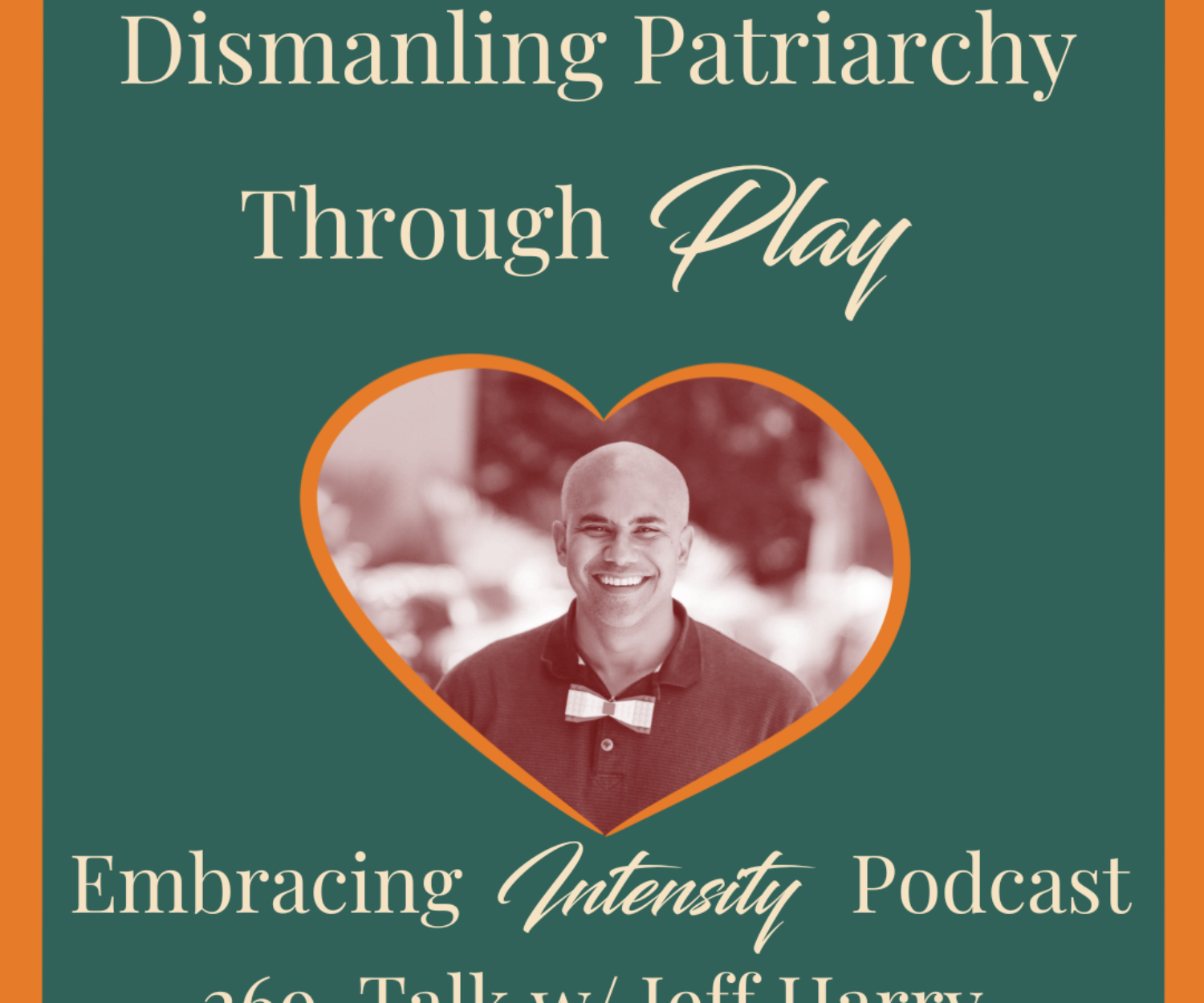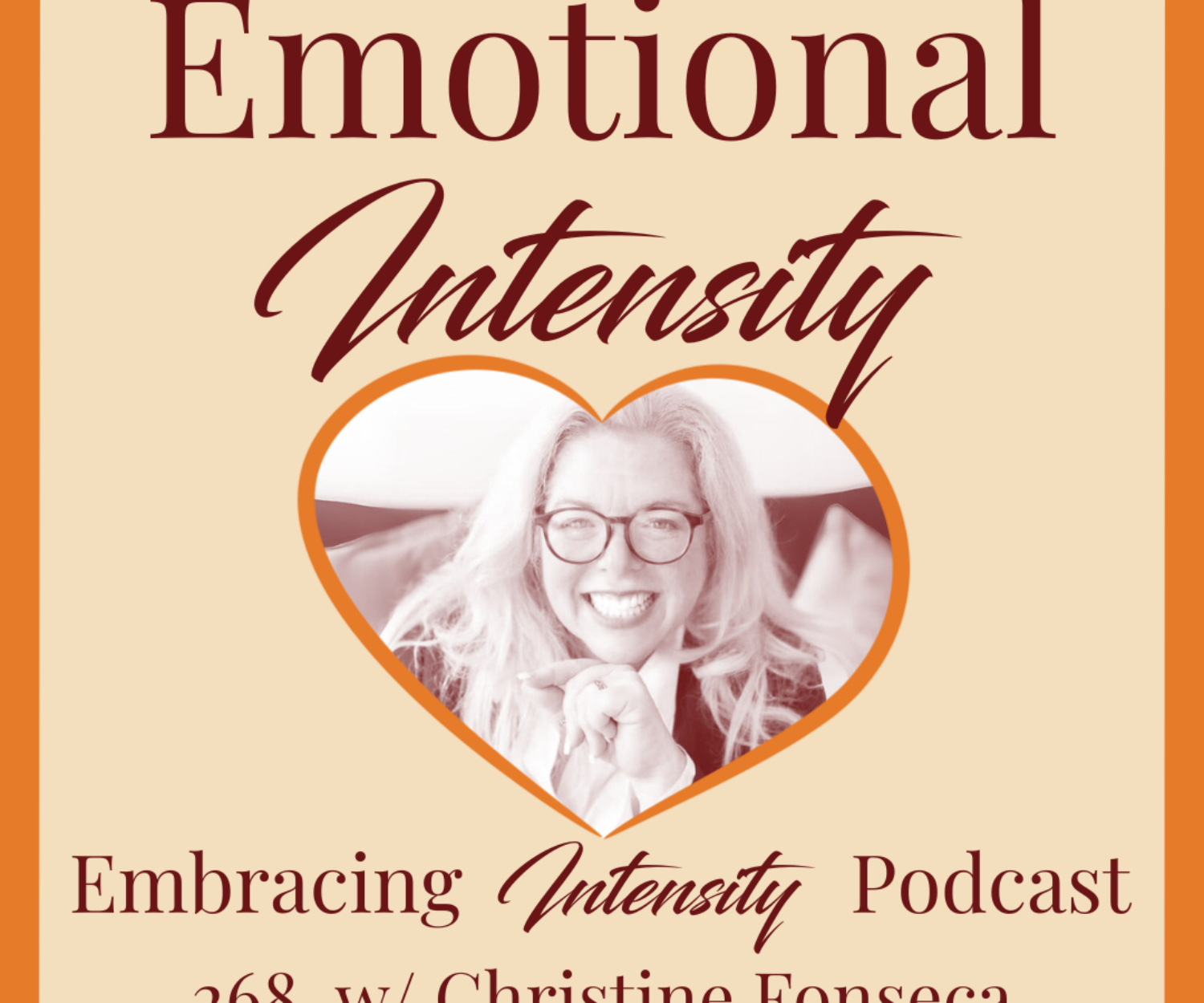Is your personality way too big for most people to handle? And do you find yourself sometimes trying to become smaller than you really are? Today we’re super excited to have Arianna Bradford join us on the show! Arianna is an intensely passionate portrait photographer who specializes in senior portraits and boudoir photography. In addition to this, she’s the founder and lead editor of the Not Your Average Mom (NYAM) Project, which is dedicated to celebrating strong women outside of the role of motherhood. Arianna really loves to talk and to express the ideas that she has going on in her head. She often found herself trying to curb the amount of talking she did when she was in high school, but it seldom worked for longer than ten minutes. Listen in today to find out what Arianna has to share about her passion and her fire.
Arianna was raised in a small town in Florida and spent the first twenty years of her life there. She thought that she would never leave. Due to unexpected circumstances, however, she moved to Texas and stayed there for about six years. During that time, she met her husband and they had two children, Miles and Charlie. Arianna, her husband, and their two young children now live in Happy Valley, Oregon. When she’s not busy writing something or photographing people, Arianna enjoys reading, playing video games, or trying to sleep. Listen in today to find out more about Arianna and her brand of intensity.
Explore More!
Giftedness * Identity * Intensity * Neurodivergence * Positive Disintegration * Relationships * Self Care * Self Regulation * Twice Exceptionality
In this episode:
- During the time that she was living in Texas, her desire to capture images of her small son rekindled Arianna’s interest in photography.
- Arianna loved the creative direction portion of photography when she started taking photos again, towards the end of 2014.
- The hard part of photography for Arianna then was that there was not a lot of money to be made from it in Austen.
- Discovering that she has a passion for working one-on-one with people, as a photographer- especially with women.
- Arianna’s main focus is on helping women realize their own individual power and strength.
- What growing up was like for Arianna.
- Arianna was raised to think past what people would tell her.
- Being raised in a household with the attitude that you may as well be straightforward because people are going to judge you anyway.
- It took Arianna a long time to realize that sometimes it wasn’t her chasing people away. It was their own prejudices and problems that did that.
- Arianna had to really try to curb her talking at high school, but it seldom worked for longer than ten minutes.
- Wanting to be smaller than she was.
- Most people believe that they need to be liked by as many people as possible.
- An anxious moment that Arianna had back in college when she was struggling socially.
- An incident that caused her anxiety and OCD to get out of control.
- Arianna believes that all emotions, even negative ones, can be channeled into something positive.
- She has made some of her greatest things in times of intense anger or sadness.
- The NYAM project was born of intense anger in Arianna.
- There are people who really identify with Arianna’s writing.
- Art has really helped Arianna with harnessing the power of her intensity.
- Working hard on communication and trying to understand where other people are coming from.
- Remember that there’s nothing wrong with being firey. People don’t have to love you and it’s okay for your fire to warm some people more than others.
Transcript
* Rough Transcript *
Ep. 105
Arianna: Spend your entire life being told that your personality is so big that people have a hard time dealing with you. You, you, you want to be smaller because you don’t want to have people not like you. And so I would always want to be smaller, especially like really, I wanna say up until I was about 20 or 21, I was always wanting to shrink.
And I would set these goals for myself to shrink, and it seemed like the more I tried to shrink, the more I expanded.
Aurora: Welcome to the Embracing Intensity Podcast. Brought to you from Quinn Mountain Retreat in the Columbia River Gorge. I’ll be sharing interviews with powerful, gifted, creative change makers who use their fire in a positive way. My name is Aurora. Remember Holtzman, after years of feeling too much, I finally realized that intensity, in the form of excitability, is actually the source of my greatest power. Now, instead of beating myself up about not measuring up to my own self-imposed standards, I’m on a mission to help people embrace their own intensity so that they can share their gifts with the world through coaching, educational assessment, retreats, and other tools to help tune in to your potential.
Hello. Today’s interview is with Ariana Bradford. I’d been following her for a while through the mom and business community here locally in the Portland area, and I definitely thought she seemed like someone I would click with. And the week before our interview, she posted a blog post on her Naam project, not your average mom that was entitled.
If you’ve been told You’re Allo Quote, you’re just enough. And the conversation that led to on her Facebook page led Abby Wood wordsmith to mention my podcast, and they had a discussion about me and it reminded me that Abby was also on my list to interview. So I asked them both to be on the show. So Abby Woods will be in a few weeks, and today you get to enjoy my interview with Ariana.
One of the things that came up in both interviews was about the power of words. And this is something I’ve thought a lot about. It’s one of the reasons why sometimes I don’t post as much online as I could because I don’t always feel like I have the time to sit down and thoroughly think out what it is that I want to say.
As part of my podcast though, I always pick a descriptive word for the person that I interview, and it’s something that I feel like describes that person. Sometimes it is. Something that they associate with their work, but other times it’s just a characteristic that I see in that person. Bonita J, for example, I said was engaging and it actually surprised her because it wasn’t something she thought of of herself at the time, but now she does and she owns it.
And so it got me thinking about how often. A lot of us intense people have aspects of ourselves that we don’t really own. So we’re afraid to own them because we don’t want to be too big, or we don’t want to seem arrogant, or we don’t wanna overstep our bounds. And so we don’t claim these things about ourselves like giftedness and.
Our own power, and that’s where I came up with the concept of your power word, which is what started my express, your power store that just opened up creating necklaces with the words from my podcast. Moving into the new year, I thought it would be a great thing to really explore what those words are in yourself that you really could own in the new year 2019.
So I’m going to be starting a challenge. Through my express your power page that will walk you through different self-exploration questions to help you come up with your power word that you want to embody in 2019. I’ll also share inspiration from other participants and also do a daily raffle of one of our power word pendants, along with a custom essential oil blend for the theme of that day.
Check it out. I’ll put a link in the show notes and you can also find it on express your power X P R E s s your power.com. Enjoy. Welcome to Embracing Intensity. Today I am super excited to have Ariana Bradford, who
Arianna: is a portrait
Aurora: photographer specializing in senior portraits and boudoir photography.
She’s also the lead editor and founder of the N Y A M project, which stands for not your average mom dedicated to celebrating strong women outside of their motherhood role. When not writing or photographing people, Ariana is usually reading, playing video games or trying to sleep. She resides with her husband and her two young children in Happy Valley, Oregon.
Welcome
Arianna: Ariana. Thank you. Thank you
Aurora: very much for having me and it was so great. It’s funny because you know, we’ve connected online and I’ve seen your work
Arianna: and I felt like there was a lot I could relate to, but I actually was
Aurora: only introduced to the, not your average mom project from a post you had last week.
Then Abby commented on and mentioned my podcast, and then when I, as I was reading through that, I realized that you definitely needed to be on the podcast as well. So interview both you, Abby, today.
Arianna: Yeah. No. Yeah. That post, it was the one about being a lot, right? The mm-hmm. Quote being a lot. Yeah. Yeah. The feeling
Aurora: of being too much and yeah.
Mm-hmm. Yeah. Mm-hmm.
Arianna: Grew up with that a lot. Yeah. Yeah.
Aurora: You’re, you’re in good company. Yay. That’s
Arianna: what I, that’s what I hear definitely. From what I’ve seen. I can, I can understand that.
Aurora: So tell me a little bit about yourself and what you are intensely passionate about.
Arianna: I am, I’ve actually slowly been moving across the country.
I was raised in Florida for over 20 years in a little town called Lakeland, Florida, directly in between Orlando and Tampa. The closest, like big city was 45 minutes. Either way. I stayed out there for a very long time and thought that I was never going to move, and circumstances kind of moved me without my expecting to Austin, Texas, where I stayed for almost six years.
While I was there, met my husband. We had two kids, miles and Charlie, little boy, a little girl. And during that time I was kind of reminded of the things that I am excited about through. Wanting to capture my son when he was very little. I had actually been at that point, you know, shooting photography off and on since I was about 13, but I really didn’t start feeling that rush again until he was born.
So I wound up starting to photograph. It started with just like little photographs from the house, and then I started photographing fashion in late two 14, early 15, and did that for a while. Really loved it, loved the creative direction portion of it. The hard part was that in Austin there’s not a lot of money in it, so it wasn’t really coming through as something that was really helping my family a lot.
So I wound up eventually starting to work with families and then realized that I really enjoyed kind of more the one-on-one working with teenagers. And actually it kind of. Looped back to earlier on in my life when I had at one point started going into getting my certificate to become a high school English teacher.
So I got a chance to kind of work more with teenagers that way. And then starting in 2017 last year, gosh, we’re already on our way to 2019. So in 2017, I kind of realized I missed fashion a lot, but I really didn’t wanna get back into that part of the industry again. I really wanted to work with regular women, everyday women, and so I started offering OI photography as my next vertical and started working with women on that and have found through that that I have a real passion, especially for working one-on-one with women and kind of helping them realize.
Their own individual power and our own individual strengths. Because unfortunately we, we just aren’t very good at recognizing that sometimes. So all of that, to say that I’ve probably become intensely passionate about making it so that people realize how strong they really are. It took me a very long time and I’m still working on that.
So that’s kind of what my main focus is these days. So
Aurora: tell me a little bit about your own personal brand of intensity. What does intensity look like for you?
Arianna: So I was raised in a house with a mother who raised me to think for myself, which was kind of a double-edged sword for her. I’m sure we can all understand that.
You wanna raise kids who are independent and spirited, but you would really like it if they didn’t. Talk back to you, which is so incredibly just on both sides of the line. But she always kind of raised me to think past what people would tell me. And I remember coming home when I was a kid and having, you know, I would be crying and I would say, you know, so and so called me stupid.
And my mother’s response was, well, are you stupid? And I would stop crying because I was so shocked by that response. And I would actually have to think, you know, am I student well, no, I’m not. And I feel like that kind of started the ball rolling in that I became a person who really almost became defiant when I could tell that people weren’t really buying into my vibe.
It almost made me less afraid of being myself more as a kid than as an adult, which sort of makes no sense. I feel like it usually works the other way around, but I grew up being very talkative. I had like a thousand thoughts a minute, and I was always wanting to share them with people, and especially if I felt that I connected with somebody and immediately I used to have this tendency to assume that.
Because I felt that immediate, like, oh, you get me. I used to want to automatically assume they felt the same way, and so we would wind up sometimes having this moment of miscommunication where they were like, you’re, you’re talking. Way too much. And I’m sitting there saying, but I had so many thoughts and I thought that you got me.
And I’ve gotten a lot better since then. But I still have a tendency to sometimes say something before I think about it and then have somebody come up to me later and say, Hey, you know that one thing that you said to so and so is probably not the best thing to say when you first meet someone. So that was kinda where I was.
I was always kinda marching to my own drum and doing things my own way, which. You know, it’s positive in its own ways, but it also tended to translate to alienating people sometimes.
Aurora: It’s funny what you’re saying about being talkative because I think people assume that when you’re talkative that you want somebody who’s not talkative or that you’re prefer someone who listens.
But actually no, because when you have someone who’s equally talkative, then you can like not worry so much about talking over each other because they’re gonna do.
Arianna: It’s, it’s so odd cuz it’s like, on one hand you want somebody who’s gonna like, listen to what you have to say, but you also want someone who’s not gonna be freaked out if you’ve been talking for like the last 15 minutes and just haven’t stopped.
And yeah, it’s, it’s such a bizarre thing. You’re, you’re really trying to, I remember actually. Being so confused because for the longest time in high school, the people that I made the best friends with were actually quiet people, like people who were very shy and didn’t talk very easily. Mm-hmm. And I don’t know if it was just because they realized I don’t actually have to talk with Ariana.
I can just sit, let her do all the talking until I’m comfortable. I’m not sure that’s what that was or not, but it was usually people who kind of stood off on the sidelines that I wound up becoming friends with. And I don’t, like I said, I don’t know if it was because I had to do, they had to do less work.
I dunno, but that was kinda how
Aurora: it turned out. Yeah. I actually had that same experience with when I talked to the quiet person in the room. Exactly. But often I was asking them questions too.
Arianna: That is something I definitely need to work on. I know personally, and I was getting better at at asking questions because I usually just wanna be like, Ooh, and this other thing that I thought of and this other story, and then I’m like, oh, you’ve been sitting here this full time and haven’t gotten to talk about yourself.
I’m sorry. Very bad, bad habit.
Aurora: Well, that’s why it’s so refreshing when you run into someone who’s the same way. Mm-hmm.
Arianna: Exactly. About
Aurora: it as much. So you shared a little bit about how it affected you growing up. Were there any cultural factors that expressed, affected
Arianna: how you expressed yourself? I was raised by a New Year Rican dad and a black mom.
So those are two cultures that aren’t exactly known for sugarcoating things. So I, I feel like, you know, there was. An attitude in my household. People were gonna judge me anyway automatically for my skin color, especially being in, you know, pot Florida. So there was kind of this attitude of, well, since they’re gonna judge you anyway, say what you’re gonna say.
And I didn’t really recognize the weight of that until I was in my mid twenties. It took a very long time for me to realize that sometimes. It wasn’t necessarily me chasing people away, it was just their own prejudices and their own problems. And if anything, it tended to make me more likely to take up space because I kind of felt like, well, if nothing I do is going to be acceptable anyway, might as well do what I was gonna do from the beginning.
So yeah, I guess you could say there was a little bit of, of a cultural. Influence in how I am. So did
Aurora: you ever feel like you had to tone yourself down or tune yourself out?
Arianna: Oh Lord, yes. In high school especially, I remember I would at least once a month get up in the morning and tell myself, Today I’m going to try not to talk as much today.
I’m going to go hang out with my friends and I’m gonna let them do all of the talking and I’m gonna do this as a completely scientific way. That was sarcasm by the way, telling whether or not they even want me to talk. I’m going to let them give me signs that I am welcome to speak in a conversation and it would always, without fail.
Last about 10 minutes. I would get there, I would be quiet, and then after a while it would feel like I was a pressure cooker and I was just keeping all this steam building up inside of me and it just didn’t feel right. And eventually someone would say something or do something and I would just immediately burst back into this.
Big, shiny ball of me, and at the end for a very long time. When I would do that, I would beat myself up on the way home, basically saying, you know, I told myself I was not going to talk, I was not going to take over the conversation. I was not gonna get loud. I was, I was going to try to be this quieter, more demure version that everybody seems to want out of a person.
I mean, Spend your entire life being told that your personality is so big that people have a hard time dealing with you. You, you, you want to be smaller because you don’t want to have people not like you. And so I would always want to be smaller, especially like really, I wanna say up until I was about 20 or 21, I was always wanting to shrink.
And I would set these goals for myself to shrink. And it seemed like the more I tried to shrink, the more I expanded. So after a while I gave up on that and just kind of realized that this is just who I’m gonna be and it’s gonna go how it’s gonna go. People are gonna accept it or they’re not. So, but I definitely get that and I totally, completely understand people who go through it.
I think, you know, a lot of us kind of operate under this belief that. We have to be liked by as many people as possible, and while I don’t agree that we need to just kind of walk around without any self-reflection, I also think that there needs to be more of a narrative out there that some people are just not going to get your vibe.
And they’re just gonna want you to, you know, they’re, they’re gonna want smaller than what you can offer. And that’s ok.
Aurora: It’s funny, I was, when you’re talking about the talking thing, it made me think about one of the people who, she was on the podcast early on, she talks about levels of giftedness and she talks about like skip thinking where you’re, it’s kind of linear still, but you’re skipping through and then she talks about, I forget the word she uses, but I, I picture it like a my map where you’re just like all over the place.
And I feel like that exactly, that’s where it’s like every single thing someone says makes you think of something else, makes you think of something else.
Arianna: You’re always on a path to another thought, no matter what. It’s just constant. You’re never in the moment. It’s kind of weird. Yeah.
Aurora: So tell me about a time when you felt like your intensity got outta
Arianna: control.
So back in college, I was having a very hard time adjusting to being away. I was really kind of struggling to find people who I meshed with, and I wound up actually becoming very good friends with these two guys named Ryan and cj. And Ryan and CJ were musicians like I was. They were both like share the same quirky sense of humor.
We spent all of our time together, and I hadn’t realized it at the time, but I had started to become almost unhealthily reliant on their company. If I didn’t have their company, I had no one else to hang out with. And I remember one day walking into the. Dorm room and usually I almost lived in their dorm room.
I pretty much only left it to sleep. And I walked in at one point and there were all of these people there watching a movie, and I remember feeling kind of so incredibly anxious and just neurotic at that point because I had this sudden thought of, oh boy, I don’t know who these people are. I don’t know if they’re going to like me, like Ryan and CJ are.
What if they turn my two best friends, my two only friends at college against me? Just some of the most. Irrational emotional thoughts you could possibly think. And I remember asking one of them at one point, which is like the most ridiculous thing I could ever think to ask. I turned to these two guys who had people over at their dorm room and said, why didn’t you guys let me know that you were asking these people over?
And, and you know, and admittedly they looked at me kind of funny and they were like, we live here. We didn’t have to tell you that. And I just remember. Kind of saying something along the lines of, well, I suddenly have a test that I have to go study for. I’ll be back, and then I had to walk it off.
Literally, I wound up going for almost like an hour walk, kind of working through. My emotions at that point, because I still hadn’t quite gotten to the point where I had appreciated myself enough to realize that my friends could have friends outside of me and still like me.
Being replaced, and that was probably the worst that it ever got. I remember having a lot of anxiety attacks that year as well. And I have both anxiety and obsessive compulsive disorder and they both kind of got a little outta hand, I think, especially after that where I, I wound up having to do a lot of Self-reflection in, in cognitive behavioral therapy to kind of get it under control.
So that would definitely be my most outta control intense moment.
Aurora: It’s fun that time when you’re going into college can be so like, it’s such a tricky time in general because you’re going from that time when you have no, when you have these close social connections in high school, if you do to like none at
Arianna: all.
Right. And you know, at that college especially, that was, I went to an honors college my first year and I remember them kinda telling us, they said, you might have been the smart one in your graduating class, but everybody here is the smart kid. And so there was almost this added loss of identity where you’re sitting there saying, I am a small fish, very big pond filled with other fish who I and for, you know, someone who kind of.
I think really at that age, I think everybody’s kind of struggling with trying to figure out their place. And when you’re kind of told at that point, well you, you know, your place is not only what, not what you thought it was, but now you’re also going to have to try to navigate it amongst these other people who are exactly like you.
That’s kind of a tall order.
Aurora: Well, at the same time, you finally have people that are exactly like you.
Arianna: Exactly. Which could
Aurora: be both a good thing and a bad thing.
Arianna: Yes. It depends on, depends on what part of you think they identify with the most. I think that is so true. Oh yeah. So tell me a little bit about how you
Aurora: use
Arianna: your fire for good.
So I am someone who truly believes that, that every emotion, even the negative ones, can produce positive results. I don’t think that we should automatically be turning negative emotions or negative feelings around, you know, how they build saying, turn that upside down. I actually don’t believe in that. I personally believe that when you’re sad or upset or angry or when you’re feeling it really strongly, that’s actually the perfect time to allow yourself to feel it and to channel it into something productive.
I used to joke that one of my greatest. Motivators was rage, was anger, because when I was angry, that was the time that I would say, I am just so mad right now. I need to make something. And I have made some of my greatest things in times of great anger or sadness. The Naam project actually came out of a moment where I was extremely angry.
Somebody had made some judgment on me just based off of the fact that they could see that I was a lady with two kids, not necessarily off of anything that was detail oriented, just the fact that they had made an assumption about me. And I was so angry about that, that my first resp, well, my first response was to write my friends, and we all complained and you know, for a bunch and felt a lot better afterwards.
But then after that, my second response was, I’m going to make something to make sure that this doesn’t happen again. And so, you know, after that the Naam project was born, that was where I decided that I was going to make something that was going to force people to actually look at women mothers specifically for who they were, not necessarily who we assume they are, just because they have kids.
So I kind of have been taking a lot of that intense emotion, especially on the negative side and trying to turn it into something that will eventually be positive and. I recently realized like about two years ago, recently, I’m 32 now, so it took until I was 30. For me to realize that that intensity in my natural voice actually does speak to some people I’ve been writing my entire life.
But I had never really thought to write. I’ve always written fiction. I’d never really thought to write as me. Since I have started writing, I have found that there are a number of people who identify with it and appreciate it. Now, are there people on the other side who don’t? Of course there always is, but I do feel like taking that inner, whatever you wanna call, that inner flame, that inner fire and, and kind of.
Extending it out there as it is, instead of trying to change it has actually started to resonate with people. And it’s not only been a nice feeling just for my ego, but it’s also just been a nice feeling knowing that it seems to be helping some people who might not necessarily know how to put what they want to say into words.
So I kind of feel like that’s been a very positive influence that I really wasn’t expecting to admit.
Aurora: Yeah. The, the post that you shared last week was definitely one that I could see resonated
Arianna: with a lot of people. I was actually very surprised by the response. I really was, I was expecting that. I was gonna say I’m, you know, I’m a lot and I feel like when you are a lot that’s.
Not necessarily something you have to be sorry for, and the number of people who came back and said, I read this and this sounded just like me. Mm-hmm. Was a lot more than I expected. It wasn’t shared a crazy amount of pie at times or anything. Mm-hmm. It was only shared I think about like 30 some odd times, but mm-hmm.
That was more than I had expected. I had expected more people to, to kind of read it and say, okay, well that’s nice Arianna. That’s nice, pat my head. Good for you. I really wasn’t expecting quite as many people to be like, oh my gosh, I totally get this. This is me 100%. One person actually posted it and said it made them cry, which was kind of a compliment in a pretty big way that it touched them in that way.
So it was kind of nice to know that. A sentiment like that is actually shared by more people than I thought. Oh,
Aurora: definitely. Well, and being online, you get to reach those people, which is
Arianna: awesome. That is the joy of it. Right? It’s like I always say the positive part of social media is that everybody’s got a voice.
The negative part is that everybody’s so, you know, very true. You never know. But yeah, it’s really nice that you get a chance to reach those people that you might not otherwise reach.
Yeah.
Aurora: Definitely. So what do you think has helped you the most with harnessing the power of your intensity?
Arianna: Hands down, it’s been art, photography, writing, music.
I have been into art since I was a kid. My mother was a, a singer and a gospel choir. My father has been a writer. They both kind of made sure that my brother and I spent a lot of time learning about the different kinds of art. And for me it was all about the performing arts, like theater, music. The only one that wasn’t quite, or the only ones that weren’t quite for photography in writing, but to me it’s always been creating that has helped me kind of harness that in a, in a big way because it’s given me a chance to.
Kind of help people see what I see, because I think that sometimes the reason why people like us tend to shoot off in a num a number of different directions is because we’re seeing so much and we kind of want people to see what we’re seeing and to hear what we’re hearing. And it’s really hard to harness all of that in one spot.
So you tend to try to force it. And I think that with art and creation, I have found a chance to kind of do that in small bite size chunks. So that people are not only getting to kind of understand the message that I’m getting across, but they’re also able to kinda understand the messages they wanna understand instead of getting them in complete barrages, which happens.
So I would definitely say that, you know, art and creation have been some of the best and strongest ways I’ve found to. Kind of not dumb myself down necessarily, but put myself in a way that’s understandable to other people and still make it feel like I’m being true to myself. What do you
Aurora: think is the best advice
Arianna: anyone ever gave you?
That actually, that honor goes to my really good friend back in Austin. He’s a mentor of mine. His name is Sam Lewis. And right when I had started to do the Naam project, I remember I was telling him I was editing a photo of somebody and it just wasn’t going well. And I told him you know what, if nobody likes this, I just, I’m scared.
Nobody’s gonna like this. And his words to me were, don’t do this so that somebody likes it. Do it because it means something to you. And to me that was so profound because, especially in art, but I think in just about everything, we’re always trying to do things in hopes of making connections with people.
We’re always doing things in hopes that people like what we’re doing and feel something about what we’re doing and give us some sort of support or some sort of signal that they’re really feeling what we’re putting down. And so to hear somebody basically say to me as an artist, and you know, artist says objective, so you’re kinda looking for that feedback.
The fact that he was like, look, just do this because it means something to you and if it resonates, it resonates. If it doesn’t, at least you know that you’ll keep doing it because you love it. That was really powerful and I have continued to try to hold that in my heart for just about everything I do.
Not necessarily disregarding people, but kind of thinking in terms of. I am doing this because it’s going to be important to me, and I cannot be the only one out there that thinks this way, and it’s started to resonate pretty well. So I guess it was pretty good advice. So yeah. Sam, if you’re listening to this, thank you.
What personal
Aurora: habits do you think have helped you to use your fire in a positive way?
Arianna: I’ve been working really hard on understanding. Trying to understand where other people are coming from because I feel like. You know, it’s really easy, especially when you’re putting yourself out there to immediately take offense.
If somebody doesn’t agree with you or doesn’t like something that you’ve said, it’s really easy to kind of get into the mindset that you’re defensive and you’re angry and this person just doesn’t get you. But what you kind of have to understand is that sometimes. The way that we communicate may not necessarily be the way the other person needs us to communicate.
And if it’s within our power to get a point across without sacrificing our message, then I think we should try that. And so I have been working pretty hard to try to understand the people I’m talking to, to understand where their minds might be if they’re upset or irritated with something that I do.
And if I can help, if I can make it easier, I try. But I’ve also tried to. Just in my own mind, try really hard not to think in terms of, I’m doing this wrong or I’m messing it all up. Like not negative self-talk, but constructive criticism. And there’s a difference. I think a lot of us automatically tend to think in terms of, oh, I’m dumb.
Shouldn’t have done that. How could I have done that? That was so stupid. Instead of thinking it in terms of, alright, that may not have been the best way to do that. How can. Do it better next time, or how can I fix the mistake that I’ve made? And so I’ve just been trying to focus on turning that inner critic into another part of.
My mental team, so to speak, trying to, trying to not work against my brain and work with it instead.
Aurora: Are there any particular books that have had a big influence on you? I
Arianna: really was hoping that I would have a good deep answer for this, but I read so much fiction my entire life that I think the answer to that is gonna have to be not really, I mean, I have tried little pieces of books here and there and gotten little things from it, but.
I haven’t really had one book that has completely and Everly changed my life. I feel like I just, I’m kinda one of those people. I tend to just take books and take little pieces from them, but I don’t know. I like, I’m a real Harry Potter nerd, but I feel like that doesn’t exactly the bill, I mean, unless somebody wants to start talking about what houses they belong in, I can do that all day long.
But unfortunately, like I just, it’s funny cause I read. But I feel like I kind of read for the pieces that, that I identify with or the pieces that I feel are gonna help me in that situation. And then, mm-hmm. Kind of the rest of it winds up being taken with a grain of salt, especially in the, you know, non-fiction self-help circle.
So I wish I had a better answer, but unfortunately no. How do you help others use their own fire? That is such a difficult question. It was a difficult question and I tried to think about it earlier too. I feel like probably the best way that I can help people and the best way that I try to help people, and this is both in my writing and in naam and in photography, I try really hard to help people kind of realize that they and themselves are acceptable, especially I think in the the OI photography industry.
There’s a very strong undercurrent of trying to empower people to understand that just because they may not look like, you know, someone who’s in a magazine or on tv, that does not mean that they’re not beautiful and that they’re not wanted and that they’re not desirable. And that to me is such a strong message that I feel we, we lose.
Daily. And so I feel like I, I try really hard to get that across with that. And I feel like, especially with some of the messages that I’ve been trying to convey to mothers, just kinda like that that piece that you read the other day, there is this, this message that I’m trying to get out there that.
We may not all be everybody’s cup of tea, but that’s kind of what makes life interesting and that’s totally, completely okay. And I’m hoping to kind of get that across to people so that there can be kind of an inner strength. And you mentioned earlier in your live video about self-compassion and I feel like self-compassion is so incredibly important because we worried so much about self-esteem.
And what I try to tell people is, I’m not wanting you to necessarily build up your self-esteem. I’m wanting you to love yourself regardless of what’s going on on the outside. So I think maybe that’s how, is just kind of trying to get across to people like, Hey, look. You’ve got this inner inner strength.
These things that people are telling you about yourself are only as true as you want them to be. There’s nothing wrong with being you and, and maybe not necessarily resonating with everyone, but you resonate with someone and you have a personal power, and you should feel more than comfortable enough to use it.
Aurora: Definitely makes me think of Renee Brooks, who I had on last week. She said that just by being you, that you’re helping people just by existing. Exactly. Exactly.
Arianna: We never really know who we help. Right? Yeah. Like it’s kind of one of those things where you’re just. Walking along, helping people without even realizing it.
Most days,
Aurora: that’s even more true now with the internet. Oh gosh, so
Arianna: true.
Aurora: I have no idea. Like I have the podcast, for example, you know, it gets downloaded, I don’t know, like two to 300 times, and I don’t know anything about most of those people.
Arianna: But that’s amazing that you’re helping that many people and that’s totally something that, you know, a lot of people would want to aspire to.
A lot of people wish that in their lifetime they knew that they helped four people much less, 200 to 300. So that’s outstanding.
Aurora: So, Tommy, is there anything else that you would like to share with the embracing intensity
Arianna: audience? Just that well, we all have things that we need to work on within ourselves, obviously.
There’s nothing wrong with being. Fiery, which is probably my favorite word that I’ve ever had used to describe me. Fiery fire is preferable. There’s nothing wrong with that. There’s nothing wrong with spending your entire life feeling like you’re different somehow. There’s nothing wrong with actually being different somehow, and there’s also nothing wrong with not.
Being one of those people, all you have to realize is that people don’t have to love you, but you don’t owe them anything either. You’re 100% your own person and you are perfect for certain kinds of people. And it’s okay. And this is something that I’m learning myself, so don’t think I’m perfect on this, but it’s, it’s totally, completely okay for your fire to warm some and not others.
That would be it.
Aurora: So how can they find out more about
Arianna: you? Well, it depends on what level. If you are interested in just finding out more about myography, you can actually find me@arianabradford.com. Ariana spelled with two Ns. If you’re interested in finding out more about the Naam project, we are actually@wearenaam.com.
Naam is N is November y a m as in Mike, or you can go to Instagram where we’re also pretty busy on there. We basically post every day. You can go to Instagram, our group name, or our username handler name, whatever is the IM Project. So all of that together, and if you’re interested in keeping up on us, just without having to be on social media, which I can completely understand some days.
You can actually go to our website and at the bottom of the screen or in the popup that comes on, after about five seconds, you actually have the option to type in your email and become part of our newsletter list that actually goes out on the 15th and last day of every month. And we don’t sell any of your information.
It’s not meant to sell anything, just meant to kind of keep you up to date and give you cool parenting advice and updates on some of the really cool people that we spotlight. So those are some really cool ways to kind of keep up if you’re interested. Well,
Aurora: thank you so much. I’m hoping that we actually connect in person sometime
Arianna: because Oh, me Too far away.
Me too, me too, madam. It was an absolute honor for you here, and I appreciate you, me, you a delight and I Absolutely. To meet in person too. It would be great. Thank you so much. No problem. You take care.
Aurora: Looking for ways to embrace your own intensity. I’ve got two free tools on embracing intensity.com to help you start your journey of self-exploration.
My Find Your Superpower course where you can explore your own unique brand of excitability and identify what it looks like when your power is well harnessed. And a free retreat planner to help you plan out your own personal self-exploration retreat. You can also join our Facebook community, the League of Excitable Women, where you’ll meet a growing group of like-minded women, non-binary folk and fems who get what it’s like to be highly excitable and are committed to creating a supportive community.
If you’d like to support the production of embracing Intensity, you can become a patron on Patreon. And receive tools such as done for you personal retreat guides, and ignite your power course. All links can be found in the show notes on embracing intensity.com.
Resources:
Join our Community & Check out our calendar of upcoming events!
Arianna’s photography website: Arianna Bradford Sign up to get their newsletter.
The NYAM Project website: NYAM
Instagram: The NYAM Project

